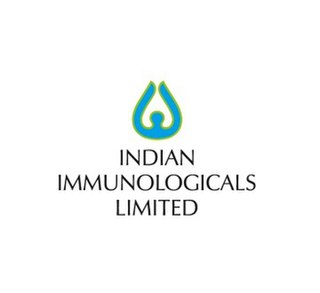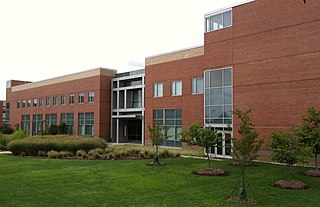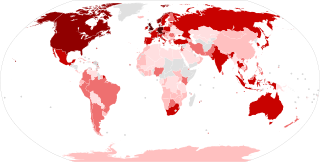
Chiron Corporation was an American multinational biotechnology firm founded in 1981, based in Emeryville, California, that was acquired by Novartis on April 20, 2006. It had offices and facilities in eighteen countries on five continents. Chiron's business and research was in three main areas: biopharmaceuticals, vaccines, and blood testing. Chiron's vaccines and blood testing units were combined to form Novartis Vaccines and Diagnostics, while Chiron BioPharmaceuticals was integrated into Novartis Pharmaceuticals. In 2014, Novartis completed the sale of its blood transfusion diagnostics unit to Grifols and announced agreements for the sale of its vaccines unit to GlaxoSmithKline.
Pharming, a portmanteau of "farming" and "pharmaceutical", refers to the use of genetic engineering to insert genes that code for useful pharmaceuticals into host animals or plants that would otherwise not express those genes, thus creating a genetically modified organism (GMO). Pharming is also known as molecular farming, molecular pharming or biopharming.

Cetus Corporation was one of the first biotechnology companies. It was established in Berkeley, California, in 1971, but conducted most of its operations in nearby Emeryville. Before merging with Chiron Corporation in 1991, it developed several significant pharmaceutical drugs as well as a revolutionary DNA amplification technique.
John Bennett Robbins was a senior investigator at the National Institutes of Health (NIH), best known for his contribution to the development of the vaccine against bacterial meningitis with his colleague Rachel Schneerson. He conducted research on the Bethesda, Maryland campus of the NIH from 1970 until his retirement at the age of 80 in 2012. During his tenure, he worked in the Eunice Kennedy Shriver National Institute of Child Health and Human Development (NICHD) and the Food and Drug Administration’s biologics laboratories on location.

JN-International Medical Corporation (JNIMC) is a U.S.-based biopharmaceutical corporation which since 1998 has been focused on developing vaccines and diagnostics for infectious disease for developing countries. This private corporation was founded in 1998 by Dr. Jeeri R. Reddy with the help of Dr. Kelly F. Lechtenberg in a small rural town, Oakland, Nebraska. From there it grew and expanded until in the year 2000 the corporation moved to Omaha, Nebraska.
Meningococcal vaccine refers to any of the vaccines used to prevent infection by Neisseria meningitidis. Different versions are effective against some or all of the following types of meningococcus: A, B, C, W-135, and Y. The vaccines are between 85 and 100% effective for at least two years. They result in a decrease in meningitis and sepsis among populations where they are widely used. They are given either by injection into a muscle or just under the skin.
The Pilot Bioproduction Facility of the Walter Reed Army Institute of Research (WRAIR) is a Contract Manufacturing Organization (CMO) facility whose mission is to perform vaccine production on a pilot scale. The facility produces pre-license Phase I vaccine candidates under cGMP conditions using both bacterial and viral based technology. It is located at the Forest Glen Annex of the Walter Reed Army Institute of Research in Silver Spring, Maryland. Its business methodology is to work with government agencies through interagency agreements and with private companies through CRADAs in order to produce vaccine candidates. Its manufacturing capabilities include bacterial and viral seed banking, fermentation, purification, and aseptic filling. The facility can perform whole campaigns from beginning to end or any individual function listed above under GMP conditions. The facility also has the capability to perform different viral titer assays on a contracted basis. The Facility has a Type V Facility Master File on file with the U.S. Food and Drug Administration.
MenAfriVac is a vaccine developed for use in sub-Saharan Africa for children and adults between 9 months and 29 years of age against meningococcal bacterium Neisseria meningitidis group A. The vaccine costs less than US$0.50 per dose.

Indian Immunologicals Limited or IIL is a biopharmaceutical company based in Hyderabad, Telangana, India. IIL is one of the largest vaccine manufacturers in the world. It was established in 1982 by the National Dairy Development Board.
Eurogentec is an international biotechnology supplier, based in Belgium, that specializes in genomics and proteomics kits and reagents as well as cGMP biologics. The company was founded in 1985 as a spin-off from the University of Liège. Eurogentec's contract manufacturing organization facilities are licensed by the Belgian Ministry of Health to produce clinical trial and commercial biopharmaceutical material and also licensed by the US FDA to manufacture a commercial recombinant protein product for the US market. Eurogentec operates two manufacturing facilities in Belgium that provide custom biologics and oligonucleotide-based components for diagnostic and therapeutic/prophylactic applications.
SynBio is a long-term project started in 2011 with the goal of creating innovative medicines, including what are known as Biobetters. This project is a collaborative effort of several Russian and international pharmaceutical companies. The largest private participant of SynBio is the Human Stem Cells Institute (HSCI), a leading Russian biotech company, and Rusnano is a key investor. The project is a significant example of international cooperation between researchers in Russia, England, and Germany. Special project company SynBio LLC is headquartered in Moscow.

The Golden LEAF Biomanufacturing Training and Education Center (BTEC) is a multidisciplinary instructional center at North Carolina State University that provides education and training to develop skilled professionals for the biomanufacturing industry. Biomanufacturing refers to the use of living organisms or other biological material to produce commercially viable products. Examples include therapeutic proteins, monoclonal antibodies, and vaccines for medical use; amino acids and enzymes for food manufacturing; and biofuels and biochemicals for industrial applications. BTEC provides hands-on education and training in bioprocessing concepts and biomanufacturing methods that comply with cGMP, a set regulations published by the United States Food and Drug Administration (FDA).
Biomanufacturing is a type of manufacturing or biotechnology that utilizes biological systems to produce commercially important biomaterials and biomolecules for use in medicines, food and beverage processing, and industrial applications. Biomanufacturing products are recovered from natural sources, such as blood, or from cultures of microbes, animal cells, or plant cells grown in specialized equipment. The cells used during the production may have been naturally occurring or derived using genetic engineering techniques.
AMRI is a contract research and manufacturing organization that provides drug discovery, development, cGMP manufacturing and aseptic fill and finish to the pharmaceutical and biotechnology industries. Founded in 1991, AMRI operates in the United States, Europe and Asia, with its headquarters located in Albany, New York. AMRI has announced deals and collaborations with such companies as Pfizer Inc., Merck & Co., Eli Lilly and Co., Takeda, Genentech, Bristol-Myers Squibb Co. and GE.

Sutro Biopharma, Inc. is a public biotechnology company headquartered in South San Francisco, California focused on clinical-stage drug discovery, development and manufacturing. Using a proprietary cell-free protein synthesis platform, Sutro is working on oncology therapeutics using protein engineering and rational design. Founded in 2003 under the name Fundamental Applied Biology, the company name changed to Sutro Biopharma in 2009. The current CEO, William Newell, joined Sutro in January 2009.
CRM197 is a non-toxic mutant of diphtheria toxin, currently used as a carrier protein for polysaccharides and haptens to make them immunogenic. There is some dispute about the toxicity of CRM197, with evidence that it is toxic to yeast cells and some mammalian cell lines.

BiondVax Pharmaceuticals Ltd. is an Israeli biopharmaceutical company developing a universal influenza vaccine called M-001. BiondVax is a publicly traded company, listed on the NASDAQ. The vaccine technology was invented in the 1990s at the Weizmann Institute of Science in the laboratory of Ruth Arnon, and was licensed to BiondVax in 2003.

WuXi Biologics is a Chinese headquartered CDMO that provides open-access, integrated technology platforms for biologics drug development.
Grand River Aseptic Manufacturing (GRAM) is a clinical and commercial sterile manufacturing contractor to the pharmaceutical industry. It has lyophilization, terminal sterilization, analytical, microbiological testing services.

SCB-2019 is a protein subunit COVID-19 vaccine developed by Clover Biopharmaceuticals using an adjuvant from Dynavax technologies. Positive results of Phase I trials for the vaccine were published in The Lancet and the vaccine completed enrollment of 29,000 participants in Phase II/III trials in July 2021. In September 2021, SCB-2019 announced Phase III results showing 67% efficacy against all cases of COVID-19 and 79% efficacy against all cases of the Delta variant. Additionally, the vaccine was 84% effective against moderate cases and 100% effective against hospitalization.









